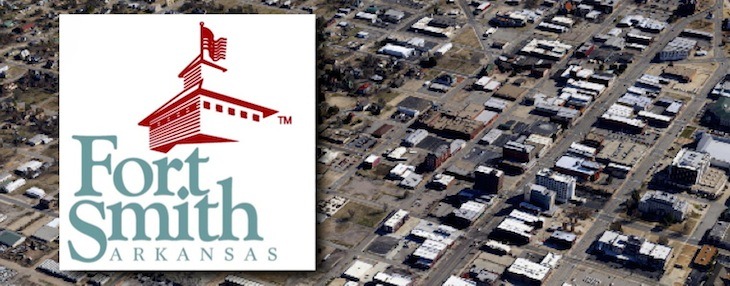City of Fort Smith seeks to sell failed sports complex property
by October 22, 2019 4:46 pm 2,487 views

The city of Fort Smith seeks to sell three parcels of land at Chaffee Crossing where the controversial and unfinished River Valley Sports Complex is located.
The land up for sale includes two tracts that create a 5.26-acre rectangular property at 7709 Taylor Avenue that runs east-west along Taylor and abuts to a larger 62.9-acre plot between Taylor Avenue, Ward Avenue and Roberts Boulevard, which was to be the River Valley Sport Complex (RVSC), a press release from the city said. The smaller tract of land is used for storage by the city, said City Administrator Carl Geffken.
The total acreage for sale is 68.16 acres, valued at approximately $1 million, according to Ivy Owen, former executive director of the Fort Chaffee Redevelopment Authority.
“When we [planned the River Valley Sports Complex] years ago, we [FCRA] gave that land to the city [of Fort Smith],” Owen said. “At today’s rate, it’s worth about $15,000 an acre. When you get over 50 acres, the price diminishes quite a bit.”
Former Sen. Jake Files, R-Fort Smith, and Fort Smith businessman Lee Webb partnered to build the RVSC in 2012, and in 2014 they convinced the city of Fort Smith to invest $1.6 million into the project. The project was to be a tournament-quality softball complex with eight softball fields, two concession stands and associated parking. It was to “economically benefit the entire region.”
“The plan was for the RVSC project partnership to leverage the City’s financial investment, using it to attract private and nonprofit monetary and in-kind contributions for the balance what was needed to completely fund the project,” noted the press release.
Acting on the recommendation of Geffken, the Fort Smith board of directors nixed the plan effective Jan. 31, 2017, after more than two years of delays on the project.
In 2017, several lawsuits were filed by the city and subcontractors over the unfinished RVSC, and the FBI investigated Files for possible wire fraud and money laundering related to use of about $27,000 in state General Improvement Fund grant money for the sports complex.
“Once the actions were taken that resulted in legal action, it became what is the city going to do? The board of directors were fine with the plan to see if we could find someone to come forth, using the RFP (Request for Proposals) process with proper bonding, to develop the RVSC,” Geffken said.
An RFP was posted in 2018, seeking a contractor or developer to step in and finish the sports complex or do something similar, but only one proposal was submitted, Geffken said.
“We worked with that party for several months but just couldn’t help them develop their proposal into something viable for both them and the City,” Geffken said, adding that plan B was for the city to sell the land.
Legal notice of the offer for sale was published Tuesday (Oct. 22) and the Request for Bids was posted on the city’s website. The deadline for sealed bids is 2 p.m. Nov. 5.
“At this point, the best thing to do is offer the land for sale and recoup whatever public monies we can that were lost when RVSC failed,” Geffken said.
However, if submitted bids do not meet the city’s expectations, the city is under no obligation to accept any bid, Geffken said.
“We can say thank you very much, and we can go to another action,” Geffken said. “I am hopeful there will be other options that people will see once we sell it. It could be developed into something else and people or groups or companies may come and say, ‘We’d like to x, y and z.”
Some work had been completed on the land prior to the issues arising. Lights and light poles were erected, two buildings were built and some fencing was installed.
“We believe there are issues with the buildings,” Geffken said.
The city intends to reutilize the light and light poles as well as some of the fencing, he said, adding it is possible the city may put up for auction the actual bricks, lumber and other materials in the buildings. Any funds garnered from the sale of the land or the materials will go back into the city’s parks funds to replace funds spent on the project, Geffken said.
Files entered a guilty plea on Jan. 29, 2018, to one count of wire fraud, one count of money laundering, and one count of bank fraud. He resigned his Senate seat in early February 2018. According to court records, between August 2016 and December 2016, while serving in the Arkansas State Senate, Files used his State Senate office to obtain General Improvement Funds (GIF) “through fraudulent means and for personal gain,” according to the U.S. Attorney’s office.
He also admitted to submitting a materially false loan application in November 2016 as part of a scheme to secure approximately $56,700 from First Western Bank. Files was sentenced June 18, 2018, to 18 months in federal prison by U.S. District Judge P.K. Holmes III. He was set to report to the federal minimum security prison in El Reno, Okla., on Aug. 2, 2018, and was ordered to pay restitution of $83,900. He also received three years of supervised release following his prison term.
He now resides in the City of Faith halfway house in Little Rock and is set to be released from federal detention on Nov. 11, according to the office of Western Arkansas Prosecuting Attorney Dak Kees.
